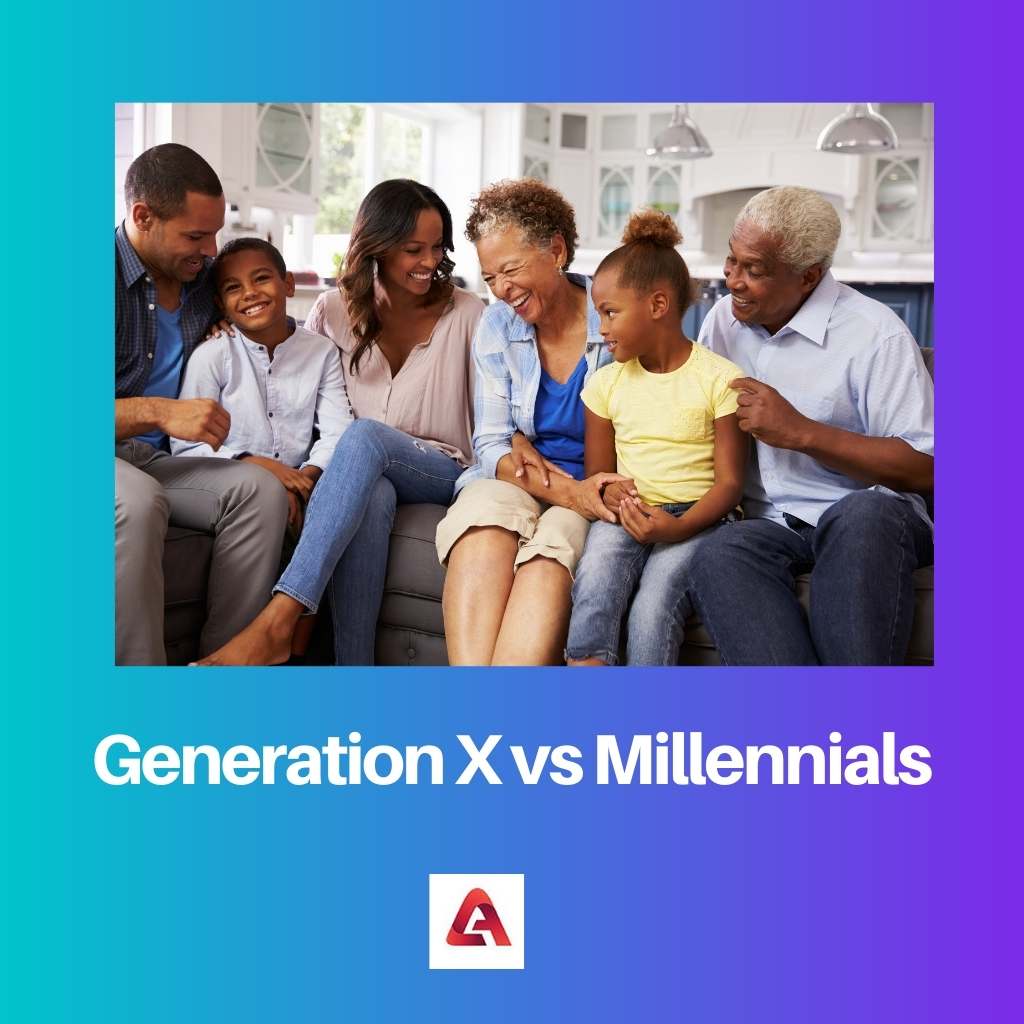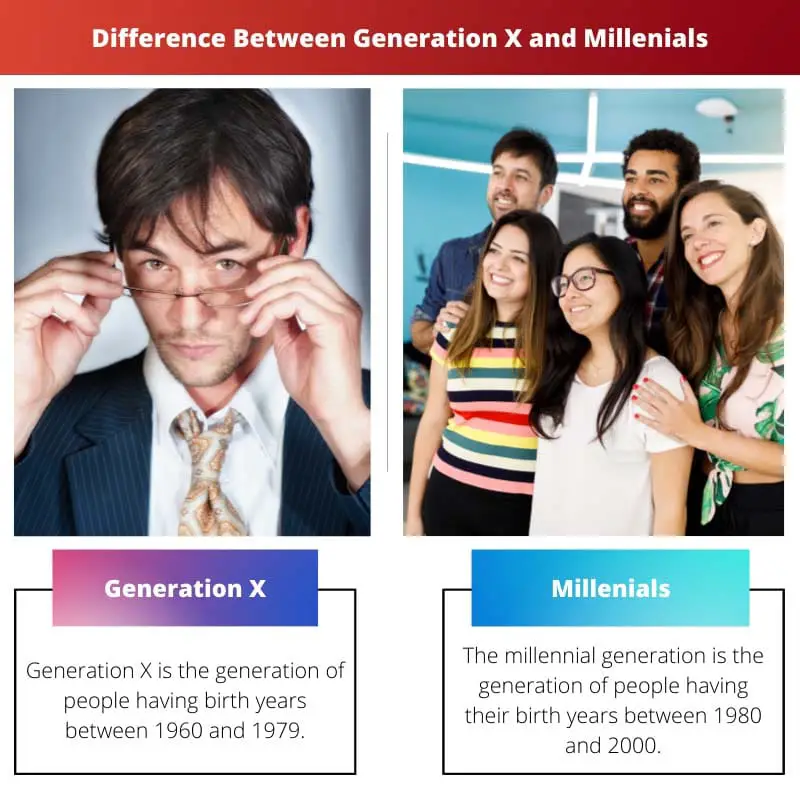The entire existence of a human being is made up of different age stages. These age stages are categorized into childhood, adulthood, and old age. However, various generations have been categorized depending on the birth year in which the person was born.
People born between the years 1928 and 1945 belong to the silent generation. People born between the years 1997 and 2012 are called Generation Z etc. Similar to that there are two other types as well, namely, 1. Generation X and 2. Millennials.
Key Takeaways
- Generation X refers to people born between the mid-1960s and early 1980s, whereas Millennials refer to people born between the early 1980s and mid-1990s.
- Generation X grew up in a time of economic and social change, whereas Millennials grew up in a time of technological advancement and globalization.
- Generation X is known for being independent and self-reliant, whereas Millennials are known for being tech-savvy and socially conscious.
Generation X vs Millennials
People born between the 1960s and 1979 are known as Generation X. They were considered self-sufficient and independent. They followed traditional means of media like radio, etc. Human beings born between 1981 to 1986 are considered Millenials. They grew up with technology.

Generation X is the generation of people that have their birth years between 1960 and 1979. The short form of Generation X is “Gen X.” They lie exactly between all the other generations as the people from the silent generation are their parents, and the millennials are the children to them.
The millennial generation is the generation of people having birth years between 1980 and 2000. The millennial generation is more into technological advances and innovation, and social media more consume them. Many people believe millennials are likelier to fit in in a team setting.
Comparison Table
| Parameters of Comparison | Generation X | Millennials |
|---|---|---|
| Meaning | Generation X is the generation of people having birth years between 1960 and 1979. | The millennial generation is the generation of people having their birth years between 1980 and 2000. |
| Birth years | 1960-1979 | 1980-2000 |
| Origin | 1950 | 1987 |
| Events Witnessed | Cold war, rise in the computer technology etc. | Higher usage of social media, higher usage of internet in general, increase in terror activities etc. |
| Descendent | Millennial | Generation Z |
| Predecessor | Baby boomers | Generation X |
| Financially concerned | More | Less |
| Internet usage | Less | More |
What is Generation X?
Generation X is the generation of people that have their birth years between 1960 and 1979. People associate various attributes with the people belonging to Generation X. People consider these people resourceful and generous. They adhere to their individuality and are pretty self-sufficient.
The term was tossed by a Hungarian photographer. He tossed this term whenever he used to give a title to the photo essays. The people from Generation X as employees possess workplace flexibility. They are extremely hard-working. They are moderately inclined to technologies and new inventions.
Generation X is also known as Gen X, and the people belonging to this generation are also known as Gen Xers. People belonging to this generation portray the importance of Independence and the important balance between work and personal life and are highly educated.
People from generation x have profound knowledge to offer to their employees or partners at their workplace. They also offer experience and resilience to millennials who are on their path to determining their career. Because they are independent, they try their best to resolve their problems on their own.

What is Millennials?
The millennials are the descendants of Generation X and the predecessor of Generation Z. The millennial generation consists of people born between 1980 and 2000. They are called millennials because the oldest people in this generation turned adults by the time of the millennia.
Initially, the term was tossed in the year 1987. Two authors, namely William Strauss and Niel Howe, tossed the term. This generation is also known as Generation Y. This generation lies between Generation X and Generation Z. They are considered the first generation to have grown up in the world when the internet was introduced.
There are several names by which this generation is acknowledged. It is also called echo boomers, Gen Y, Generation Me, etc. Many studies have found out that even though millennials have grown up in the world of the internet, they are also passionate readers. However, they are considered financially disadvantaged among all the other generations.
Even though millennials depend on their parents for financial support, they solely focus on self-growth. People consider millennials as self-centered people, but they are moderately like that, and they are also well-educated. They also face mental health issues, and they try to work on them.

Main Differences Between Generation X and Millennials
- The birth years of the people belonging to Generation X are between 1960 and 1979. On the other hand, the birth years of the people belonging to the millennial generation are between 1980 and 2000.
- The inclination of Generation X is less toward the internet. On the other hand, millennials tend more toward the Internet.
- The descendant of Generation X is millennials. On the other hand, the descendant of millennials is Generation Z.
- The predecessor of Generation X is the baby boomers. On the other hand, the predecessor of millennials is Generation X.
- Generation X is comparatively more concerned about finances. On the other hand, millennials are comparatively less concerned about finances.
- The term Generation X was tossed in the year 1950. On the other hand, the term millennials were tossed in 1987.
- The term Generation X was tossed by a Hungarian photographer. On the other hand, the term millennials were tossed by two authors, William Strauss, and Neil Howe.

- https://www.mmaglobal.org/publications/MMJ/MMJ-Issues/2009-Fall/MMJ-2009-Fall-Vol19-Issue2-Complete.pdf#page=112
- https://books.google.com/books?hl=en&lr=&id=yKy4AwAAQBAJ&oi=fnd&pg=PR9&dq=millennials&ots=9tVtiA0jcF&sig=3j8tG85QV6ESRU8tOVCgr943xmU

Analyzing the unique attributes of Generation X and Millennials offers valuable insights for designing education curricula, professional development programs, and generational-focused initiatives.
The unique experiences of Generation X and Millennials are reflected in their characteristics, shaped by the technological, social, and economic shifts that took place during their formative years.
Both generations have distinct contributions to the workforce and society, with each group bringing in different perspectives and skill sets to the table.
Understanding generational differences is essential for creating effective communication strategies, organizational management, and collaboration between age groups within a workforce.
The differences in generational characteristics offer unique opportunities to leverage the strengths of each group, fostering a diverse and inclusive environment in various sectors.
Generational understanding contributes to the development of meaningful intergenerational relationships and the dissemination of valuable knowledge, creativity, and innovation across different age groups.
The distinct attributes of Generation X and Millennials are vital for understanding consumer behavior, market trends, and the evolving workforce dynamics in modern contexts.
An in-depth exploration of generational characteristics allows for the creation of strategic marketing campaigns and tailored products or services that resonate with diverse consumer groups.
Leveraging the strengths and competencies of different generations in business settings can lead to enhanced creativity, innovation, and problem-solving through varied perspectives and experiences.
Generational differences reflect the social climate in which each generation grows up. Therefore, it is crucial to understand the unique experiences of each generation.
Exploring the nuances of Generation X and Millennial characteristics enhances the collective understanding of societal transformations, cultural shifts, and historical contexts across different epochs.
The interplay of generational traits presents an enriching landscape of diversity, fostering interdisciplinary collaboration, and knowledge exchange within educational and professional environments.
Acknowledging the differences between Generation X and Millennials provides insights into the evolving societal values, technological advancements, and shifts in consumer preferences across different generations.
A comprehensive understanding of generational characteristics facilitates the development of adaptable strategies for organizational leadership, talent management, and workforce development.